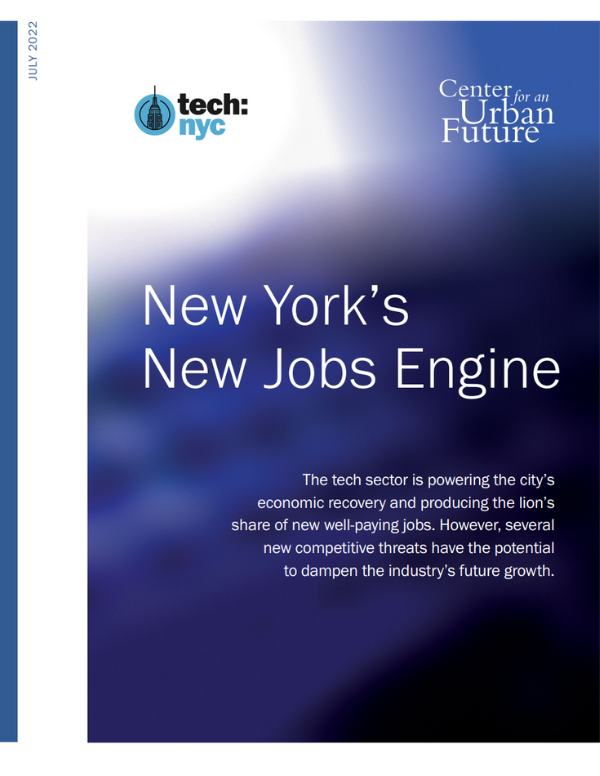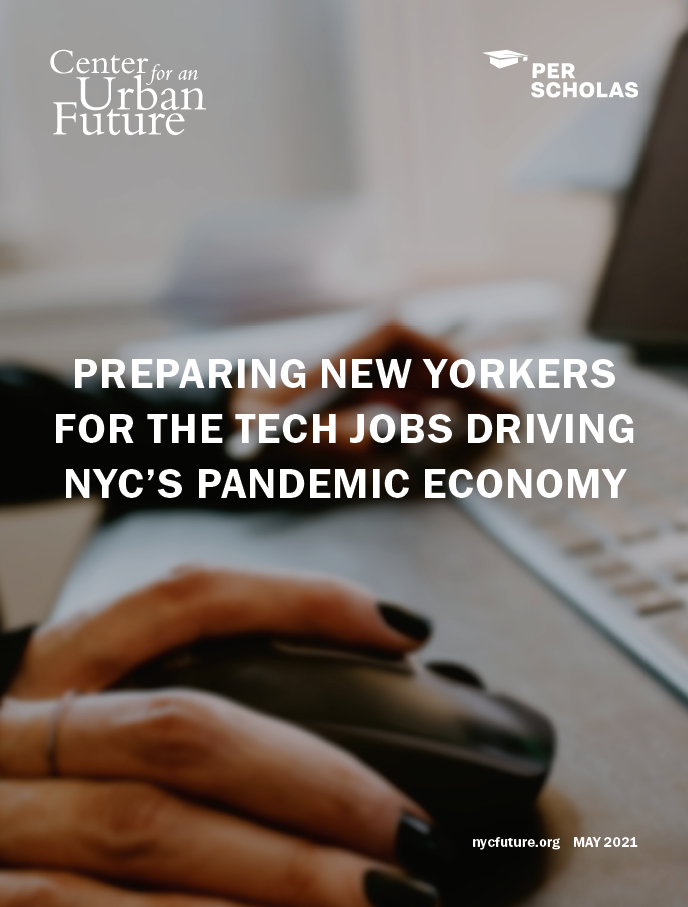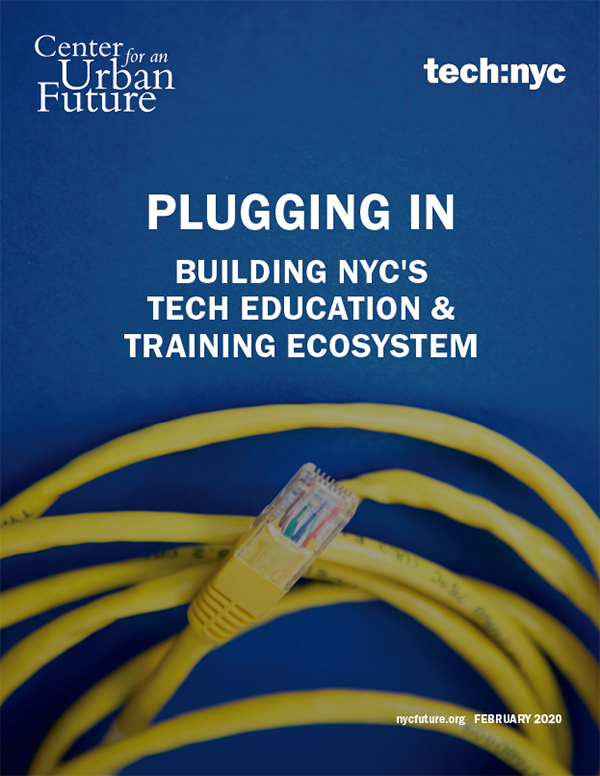Over the past decade, the tech sector emerged as one of the most important parts of New York City’s economy, growing at a faster rate than nearly every other industry and becoming one of the most reliable sources of new middle income jobs. The rise of the city’s tech sector—which employed more than 330,000 people across the region prior to the start of the coronavirus pandemic—also brought much needed economic diversity to an economy that had previously been too dependent on Wall Street. But as this report shows, a large and growing number of the city’s tech companies are experiencing significant economic pain. Many of are in jeopardy of going out of business, or significantly reducing their workforce, while countless others have indefinitely delayed expansion plans.
Unlike especially hard-hit industries such as restaurants and hotels, this economic crisis has not affected every tech company in the same way, and many have been able to transition more easily to working from home than non-tech companies. Dozens of New York-based tech firms are actually growing and adding jobs at this time, thanks to increased demand for digital services for consumers and businesses. Others seem able to weather the storm, at least for now.
But our research finds that a sizable portion of the city’s tech companies are experiencing dramatic declines in sales and being forced to delay product launches and cancel fundraising rounds. As a result, many are laying off or furloughing employees. And experts believe that a not-insignificant number of tech startups could run out of cash and shut down operations.
Despite the serious financial challenges facing so many New York-based tech companies, our research suggests that a large number of tech companies have not been able to benefit from the federal CARES Act or from city-sponsored aid programs for small businesses.
This report—a partnership between the Center for an Urban Future and Tech:NYC—aims to provide a new level of detail about the impacts on New York City-based tech companies from the coronavirus crisis. Based on interviews with nearly two dozen company founders and executives, investors and industry leaders, the report also includes a number of ideas—informed by tech sectors stakeholders—of how city, state and federal policymakers could help New York’s tech companies through this crisis.
Tech companies operating in the sectors directly impacted by the crisis – retail, hospitality, travel, and entertainment in particular – have seen revenue fall dramatically.
“Startups that are in the travel and outdoor space are getting hurt badly, as are hospitality-focused companies,” says Oliver Libby, managing partner of Hatzimemos / Libby Holdings. “Startups focused on enhancing travel bookings have gone to pretty much zero. If you’re in restaurant tech now, it’s not good.”
Kitch, a startup in the hospitality industry based at New Lab in the Brooklyn Navy Yard, has experienced a “100 percent decline in sales,” says Dan Unter, CEO and co-founder of Kitch. “We had just raised money and started four pilots. The money was reduced, and the pilots all fell apart. Our customers are all shut down, and maintaining communications with them has been challenging. Our primary investor took back 60 percent of the financing, and all of our initial deals fell through.”
Another New Lab company that wished to remain anonymous believes it is “50/50” on whether it will survive the crisis. The start-up’s revenues have declined by more than 80 percent. Between new business being curtailed and unpaid outstanding invoices, they are “currently down about $75,000 in revenue” and have laid off two or three employees.
Farmshelf, a fellow New Lab start-up that sells indoor farms to businesses, schools, and universities has seen a dramatic downturn in sales. “When COVID hit, every single one of those markets shut down,” reports co-founder Suma Reddy. Farmshelf’s subscription revenue and new sales have both fallen steeply as a result, in turn affecting future financing opportunities. “We were in the middle of a series A fundraiser, kicked off in February, which we are now having to re-evaluate.”
Tech firms in the entertainment sector have also seen revenues drop dramatically. “If you are in entertainment, you’ve been hit,” says Charlie O’Donnell of Brooklyn Bridge Ventures. For example, companies such as SeatGeek, which is entirely reliant on events and entertainment business, have seen their market completely dry up. SeatGeek is headquartered in New York City and has reportedly cut its workforce in half.
Circuit, a New York based company that operates micro-transit routes in municipalities across the US, was projecting 60 percent revenue growth but has since revised projections down to 2019 levels. "About 20 percent of transit revenues are down over April and May," reports co-founder Alex Esposito. "Although some of the cities that we operate in like New Rochelle, San Diego and Hollywood, FL are still running our services for essential needs, we have had other sites shut down completely . . . We also lost a large deal when SXSW was cancelled. Events made up 5 percent of our revenue, but this was a growing piece of our business."
Investors confirm that companies in retail and events were some of the first to see substantial drops in revenue. "Around 20 percent of the portfolio experienced negative impacts to revenue from COVID in March – companies with a retail presence and events-based businesses,” reports Susan Lyne of BBG Ventures.
The deep impacts being felt by tech companies in the entertainment, retail, restaurant, and travel spaces suggests challenges ahead for New York since tech start-ups operating in these directly impacted sectors make up a large share of all tech companies in the five boroughs. Our analysis of 2018 data from Crunchbase, a global database of tech-enabled start-ups, reveals that more than 3,000 NYC start-ups operate in events, sports, and entertainment, while 2,300 start-ups operate in the consumer goods, apparel, shopping industries. There are also almost 600 start-ups in real estate, more than 400 in food and beverages, 400 in travel and tourism, and nearly 300 in the transport sector.1
However, our research shows that it is far from just start-ups in these subsectors that have been affected by the economic fallout from the pandemic. For example, Hicham Oudghiri, co-founder and CEO of data company Enigma, says that his company’s sales “will easily drop at least 50 percent.”
Brad Svrluga, General Partner at Primary VC, says that only about five or six companies across his portfolio of 35 to 40 active ventures are reporting good economic news. “Literally everybody else is talking about cutting costs, cutting staff, and at the bare minimum freezing hiring.”
“One of the things that is most exciting about the New York tech industry is that it is so intertwined with the other industries that call the city home: financial, media, advertising, pharmaceuticals,” continues Svrluga. “When those parts of the economy grind to a halt, the tech ecosystem that serves them does as well.”
Social distancing is also devastating tech companies reliant on physical locations
Businesses that rely on physical space have also been hard hit. “Anything that has four walls, anything that’s a club concept, anything that depends on retail that’s not grocery, those are all tough spaces right now,” says Oliver Libby.
For example, The Wing, which provides co-working and community spaces aimed at women, announced the closure of its spaces on March 14 and lost 95 percent of their revenue as a result. The Wing has subsequently announced it has laid off or furloughed the majority of its employees in order to remain solvent through the year. “That’s a business that is primarily based on people meeting in physical spaces,” says Charlie O’Donnell, who is the Wing’s largest seed investor. “They made the ethical decision to close their spaces, but that then results in the loss of all revenue.”
New companies focused on physical community are struggling to adapt to a new normal, notes tech entrepreneur and investor Brian O’Kelly. “Ethel’s Club just raised about $1 million to open what is the first social club designed with people of color in mind. It opens up, does great and then COVID happens. Social distancing does not do good for your social club,” says O’Kelly. “The founder is now selling digital memberships to her physical clubs. She’s getting amazing comedians and performers to do sets and things under the brand, and expanding that beyond New York. But all of these folks are running against the clock. A lot of folks don’t have that same ability to pivot like that.”
Real estate property-tech firms have also seen their business models upended. Aaron Block, co-founder of the venture firm Metaprop, reports that one company in the student housing space is facing a totally wiped-out market. With universities and colleges shut down and student leasing at a standstill, there is little need for the metasearch, apartment finding, and process management they provide for students and property managers.
Similarly, Lina, a company that provides shared spaces for medical practices across Manhattan, has been forced to close all its spaces except those providing emergency care, and has lost most of the revenue it generates from these clients. “They can’t charge people for space they can’t access,” says Charlie O’Donnell.
“One of our portfolio firms is a property tech company that had a small number of locations,” says Libby. “They had to shut all their locations. The majority of their workforce—maybe a dozen people—got furloughed.
With stay-at-home directives in effect across the country, even micro-mobility companies that offer safer alternatives to public transportation have been hit. “This pandemic has created an incredibly difficult situation for a lot of companies, and just like everyone else we have had to make a lot of tough decisions,” says Haley Rubinson, Director of Business Development at Revel, an electric moped-sharing company based in Brooklyn and operating in five cities across the US. “Ridership is down considerably as one would expect with people urged to shelter in place.”
Many tech start-ups are hurting because their customers and suppliers both have been hit hard
Our research found that many of New York’s tech companies have felt downstream effects as their larger customers and suppliers have been hit. “Also vulnerable are the startups that were reliant on pieces of the supply chain that got knocked out,” says Libby. “I know some startups that had their manufacturing in Wuhan. Most startups don’t have resilience in their supply chain.”
“Our entire business is selling software to large manufacturing companies, and guess what has happened in last 100 days: all those flows have been messed up and our customers, or potential customers, half of them are just dead in the water,” says Brian O’Kelly. His startup, CMDTY, was very fortunate to enter the crisis with a healthy amount of cash on hand but faces a tough road ahead. “We, like everyone else, are downstream of something, and we’re downstream of these massive manufacturers. So if the world doesn’t get back to business, I don’t know how we’re going to sell anything.”
Small, innovative firms also face major revenue losses from cancelled or delayed orders. “We had two major customers push back multi-million-dollar deals (one where we had a PO) until at least the first quarter of 2021,” says Jeff Crystal of Voltaic, a solar charging company based at New Lab. “We are a ten-person company so that is a lot for us. Those deals were probably 60 percent of our 2020 planned revenue.”
Investors also say that supply chain vulnerabilities have slowed some operations. Lyne of BBG Ventures notes that two companies in the BBG portfolio “have experienced meaningful impacts to the supply chain, such as factories and distribution centers closing.”
Supply chain impacts can be especially hard on early-stage hardware firms. “For companies with hardware components this is a particularly tricky time because 1) vulnerabilities in supply chain are exposed as the virus hits different regions at different times and 2) investors may not be able to experience the product in person,” says Hilary Howe, venture partner with New Lab.
In today’s globalized economy, crisis-linked supply chain disruptions can be devastating to New York start-ups wherever they occur “I know some start-ups that had their manufacturing in Wuhan,” says Oliver Libby. “Most start-ups don’t have resilience in their supply chain.”
Fintech and ad tech startups are also hurt by broader market forces.
Much like manufacturing, disruptions in financial markets and advertising have rocked the thousands of New York tech start-ups that are intertwined with those industries. Our analysis of data from Crunchbase reveals there are 1,500 tech-enabled start-ups in New York City in the finance sector, as well as 950 in advertising—many of which will experience knock-on effects from market downturns.
“If you are a fintech company in the lending business, the credit market is all over the place right now,” says Charlie O’Donnell. “I have one company whose revenue is directly tied to the willingness of lenders to lend money. That market has been hammered.”
O’Donnell expects the same for the advertising market, saying that “digital ad agencies will get clobbered” as the cost of advertising comes down. “Anyone getting paid based on a cut of advertising spend is losing out. The cost of a digital ad has gone down a lot: the supply of advertising has gone up (everyone is online) but demand has fallen as companies have cut back on advertising.
Circuit, the transit company, makes about half its revenue from advertising on its vehicles. "We normally make around three new advertising sales per week, but have had one in the last three weeks," says Alex Esposito. "A large share of the advertising revenue typically realized in March and April is down, although thankfully many advertising clients are rescheduling rather than cancelling contracts. We're forecasting a range of scenarios but in our central case advertising revenue will be down 20 percent on last year."
More generally, the outlook for business-to-business technology firms is bad, reports Samantha Bohbot of Digital Currency Group, which invests in blockchain and digital currency companies. “During crises, companies focus on their core operations, deprioritizing new, innovative projects—which is where blockchain implementations normally fit in. Of the 27 Digital Currency Group companies with a New York presence, approximately one quarter sell to enterprises.”
Companies that have recently scaled up for growth are the most exposed, leading to wrenching changes in business strategy.
Our research found that early-stage and R&D-focused companies, which are inherently less reliant on revenue, may be less exposed to the effects of the crisis in the short term. If their investors weren’t expecting to see revenue gains in the short term, there is less reason to fear when that revenue doesn’t materialize. But the many start-ups that recently scaled up or were in the process of doing so may be in for significant trouble.
“If you’re a five-person company that just raised a seed round, life may suck but you can survive,” says Charlie O’Donnell. “If you just ramped up to 150 and expecting growth, now your revenue has dried up and you have a big problem.”
Other investors confirm that the most exposed companies are those just beginning to scale up. “If you’re an angel- or seed-backed company, you’re probably not going to go under right now. They’ll have problems for sure, but probably won’t die. And bigger companies that have done big rounds will probably make it through,” says Oliver Libby. “The most vulnerable group are the companies that begun their skyrocketing growth phase but hadn’t gotten very far and hadn’t achieved enough scale—or had enough momentum—to be self-sustaining. Companies with around 30 to 150 employees that needed to raise money are the perfect concoction for problems right now. Those startups—often a Series B or C company—have much higher capital requirements, but they probably don’t have enough sales to get a loan and probably don’t have enough of a track record with a bank. They are burning through half a million a month, they probably have only a couple months a money, and are not able to get enough sales right now.”
Many of these companies were already expecting to churn through money as they scaled up, but they didn’t expect to get to market—or the next round of financing—during a major economic downturn. “The thing for New York policymakers to remember is that most of these companies are negative burn,” says Brian O’Kelly. “They are losing money every month with the anticipation that they’ll hit the milestones so they can raise more. That means getting to market with a product and proving it’s a monetizable product. But it’s hard to hit those milestones in a 30 percent economic decline, and it’s also hard to raise more money when everyone is stuck on uncertainty.”
Fellow investors reaffirm that securing additional financing may be one of the biggest issues facing fast-growing tech firms. “The companies we see at most risk right now are those that were in the early stages of fundraising or just starting, have 3-6 months of runway and are in ‘nice to have’ categories rather than need to have,” says Hilary Howe, venture partner with NewLab. “We expect the pace of fundraising deals to slow significantly and for trust and conviction to take longer to build especially without an existing relationship.”
Surviving the crisis may depend on whether companies have enough funding to last until businesses reopen and the overall economy begins to recover. “The nature of the funding cycle is that you’re funded for a year, or two at best,” says Charlie O’Donnell. “Most of the time companies go out of business because they can’t get another round of funding . . . In a very bad scenario where quarantine lasts until there is a vaccine, 40 percent of companies won’t make it. If people don’t have a ton of funding, then without a third or fourth quarter that looks anything like normal it’s impossible for investors to make the case that the business is salvageable.”
Indeed, investors paint a stark picture for New York’s growth-stage start-ups. “Companies will die because of this. Period,” concludes Brad Svrluga. “Some of that’s because of the sector they are in: if you sell into the restaurant or hospitality industry and don’t have a lot of cash on the balance sheet, and the plan was to launch a financing process in 2020 to raise money to fuel future growth . . . you are dead in the water.”
For these highly exposed firms, major staffing cuts may be the only way to survive. “The later stage, the more asset heavy, the bigger the impact,” says Aaron Block. “It’s growth related: these companies have undertaken significant upscaling to prepare for growth, and so when growth isn’t coming that’s what gets cut. Sales, marketing, customer success, administration. Anyone you can.”
Early-stage firms may be able ride out the crisis, provided they have the funding in place. But for very early start-ups seeking capital for the first time, funding may be difficult to come by. “I am really concerned about the early stage financing market,” says Charlie O’Donnell. “If you are a VC fund backed by institutions, you’ll probably be okay because the money will be there. But smaller funds backed by individuals will have more trouble: individuals are feeling less wealthy and are the first to pull out. These small seed and angel funds, where companies get their first $500,000, will be in a lot of trouble. For those very early startups, it could be very difficult to get funding for a while.”
Layoffs in the sector aren’t yet widespread, but a growing number of NYC-based tech companies are cutting staff to weather the storm
Most of the tech executives and investors we interviewed say that a large share of companies in the sector have already had to lay off employees.
Prop tech companies and other start-ups that are reliant on physical locations appear to be especially hard-hit. “Most companies are cutting 20 percent to 50 percent of their personnel,” says Aaron Block. “Some in the most heavily impacted sectors, such as those in tech enabled business housing and others that have to take on physical space as part of their business model, are laying off up to 100 percent.”
Layoffs at BBG Ventures-backed companies have also been concentrated in firms dependent on physical space. “Around 27 percent of the portfolio has decided to implement layoffs,” says Susan Lyne. “These are primarily companies with a physical presence in which staff is no longer needed.”
But other sectors are also making staff reductions ahead of expected revenue shortfalls. Data company Enigma has had to lay off about a third of its workforce, according to CEO Hicham Oudghiri. And according to Samantha Bohbot, one of the New York-based blockchain and digital currency companies that her firm invested in expects to cut 30 percent of their employees in the city.
Tech firms are also reducing their workforces in order to preserve enough funding to survive the crisis. Noken, an online travel booking and management company headquartered in New York, has had to lay off two-thirds of its 25 employees, according to investor Charlie O’Donnell. That decision will ensure their existing funding will last them through to the end of the year.
"It's a total bloodbath," says the co-founder and CEO of a New York–based data analytics start-up with more than 150 employees. "It's not good for anyone and we've had to make layoffs."
Companies that were looking to expand in 2020 are now downsizing. “We have one company that has gone from expecting to grow their staff by 50 percent this year to instead last week cutting 25 percent of their workforce,” says Brad Svrluga. “They are a good size and super successful, but the majority of their customer base in a sector that has been devastated by quarantine. All their offline business is gone. They will grow again, but we don't have any idea when. It’s only by cutting that they can survive.”
Our research found that staffing decisions are often dependent on projected revenue, and more layoffs may be coming. “Very few [of the New Lab companies] have laid off or furloughed to my knowledge yet, but there are plans / triggers to do so if and when revenue declines/cash reserves fall to a certain point,” says Hilary Howe, venture partner at New Lab. “Companies have let go external consultants as a first order and one company let go about 5 percent of their team that were unable to adjust their skills into roles more appropriate for the current clime.”
Farmshelf employs around 30 full time employees and 15 contractors and, after trying to weather the first weeks of the crisis, was forced to lay off many of its contractors when the shift to working from home meant they were no longer needed for on-site maintenance, according to Suma Reddy.
Circuit employs around 140 drivers across the country and has been forced to reduce hours and in some cases furlough staff where its routes have been shut down entirely. This includes 8-12 drivers normally employed over the summer in Brooklyn, where their seasonal route is unlikely to operate this year. "Our drivers are employees with W2’s so these are real jobs that have been lost," says Alex Esposito.
“Thus far we’ve been able to retain everyone, but that could change,” says Andrew Hoppin, CEO and co-founder of a healthcare data app, CoverUS, based at the New Lab. “[The crisis] ups the risk. We're an early-stage venture pre-revenue, with six employees, just coming to market commercially this summer and raising our seed within 2020. Our customer pipeline is delayed, and thus evidence of traction delayed, and thus harder to close our seed.”
Not all NYC-based tech startups are struggling. For some, the unique nature of the crisis has presented new growth opportunities
Despite the crisis, venture rounds are moving forward. And well-positioned companies are seeing unexpected growth—and in some cases, record-setting revenue.
“Financing rounds are still happening. Some are getting minor haircuts, but most of it has been moving forward,” says Oliver Libby. “There are definitely some winners here, especially direct to consumer companies. One of our companies is a food brand. Another is a supplement brand. They are shipping like they’ve never shipped before.”
“A lot of our consumer packaged goods (CPG) brands saw strong March performance, including Daily Harvest [a frozen meal delivery service],” says Amanda Eilian of Able Partners. “I think that some of this benefit will be sustained, as the crisis acts as an accelerant for trends already underway.”
According to Samantha Bohbot, one online game company that her firm invested in had its best performing quarter ever. Another company that offers Bitcoin e-bates to online shoppers saw sales rise across most major categories (travel being a notable exception).
Better, a 100 percent online mortgage company, reports seeing a surge in demand due to lower rates. “We're currently operating our mortgage production at 200 percent and generated an all-time high of $1 billion in loans this month,” says Arthur Matuszewski, Better’s VP of Talent. “We fortunately have not had to do layoffs, and have instead increased our hiring rate by committing to hire 1,000 or more employees across sales and operations through the year.”
With people unable to go to the gym for exercise, Mirror, a New York-based home fitness company that combines hardware and software, has seen sales increase significantly, according to Brad Svrluga. Another New York firm to benefit in his portfolio has been Slice, which provides mobile and online customer management for local pizzerias to help them compete with larger chains. Its revenue is based on a small share of order values processed on its platform, and with food delivery orders rising, the company has experienced record revenues through the lockdown. Then there is Clare Paint, the direct-to-consumer online paint platform based in New York, which Charlie O’Donnell reports has done 2.5 times its normal revenue, as people have more time to start home improvement projects.
Several companies are revising their business plans to take advantage of surging demand. "we’ve seen a number of bright spots where our portfolio companies are quickly pivoting and even accelerating product launches to support their customers,” says Alexa von Tobel, cofounder of venture firm Inspired Capital. For example, Umbrella, a Brooklyn-based platform that connects seniors to ‘neighbors’ who can help with tasks around the home, has seen a tremendous uptick in calls from seniors who are in urgent need of grocery delivery. “On average, they're getting a call every minute from a senior or caregiver trying to arrange grocery delivery.”
Farmshelf, the indoor farm provider, is also seeing the crisis as a chance to pivot away from business clients towards a new consumer product line for the home. “There was already lots of demand with people wanting to be able to use it as a way to be more self-sufficient, particularly in cities,” says co-founder Suma Reddy. “COVID has really driven and accelerated this move into a consumer play. In some ways this is energizing because it has confirmed that the direction we wanted to go was the right way.”
Firms in digital health may also have scope to benefit while also playing an important public health role. K Health, an AI supported medical imaging diagnosis and telehealth platform headquartered in New York, has experienced significant growth and is rolling out partnerships with states such as Louisiana to help combat the virus, according to Brad Svrluga.
“In some specific cases, such as healthcare, telemedicine and fintech, we have seen an uptick in demand for services,” says Jalak Jobanputra, founding partner of Future\Perfect Ventures. Jobanputra cites New York-based Current, “a mobile banking startup serving the unbanked/underbanked based in NYC that has already begun depositing stimulus checks for their customers.”
While some companies weather the storm, others have experienced a windfall. “One [New Lab] company has seen their market expand significantly due to COVID-19 along with a reduction in friction around regulatory and customer adoption concerns,” says Hilary Howe of New Lab. “As a result, they are seeking a larger round than before in order to meet the growing demand.”
What should city, state, and federal policymakers do?
Ensure startups can access federal, state and city aid programs
Some of the grants and loans available for small businesses require companies to show revenues. But many startups don’t have that.
“Many startups don’t make revenue, even if they employ lot of people. So we need to extend some programs to cover startups. There needs to be a different set of criteria,” says Oliver Libby.
Early-stage startups sometimes don’t even have staff on payroll, as is the case with New Lab-based Kitch, making them ineligible for the Payroll Protection Act. “Seeing as we don't fit into the stimulus package (no employees to date), it would be great to be supported on some other level,” says co-founder Dan Unter.
It may also be difficult for tech start-ups to qualify for the New York City small business loan program, as many are unable to prove that revenues have fallen by more than the required threshold of 25 percent. “As an example, companies selling to enterprises may not register an immediate revenue hit, while new projects they were counting on are delayed or indefinitely postponed,” says Samantha Bohbot. “Other seed stage companies are pre-revenue…We would support changes to the eligibility criteria that allow them to access business relief assistance, so long as they maintain their workforce and meet other requirements.”
CLIP Bikes, a company based at New Lab, is one such business that could use relief but does not qualify for any existing program. “As we're pre-revenue, we do not have access to any of these grants,” says CLIP’s COO Clement de Alcala.
Our research found multiple vulnerable tech companies that have either little-to-no revenue or little-to-no payroll—and thus fail to meet the qualifications for government-backed loans or grants. “There are a slew of thinly capitalized early-stage companies in NYC that do employ people but have modest revenue or are pre-revenue,” says Andrew Hoppin of CoverUS. “Obviously, they're very vulnerable, and may not qualify for loans based on revenue loss. Many, especially with founder employees, have below-market payrolls as well because they are investing sweat equity, and so the Federal Payroll Protection Program is only modestly helpful as well.”
Confusion about the CARES Act and other programs has slowed access to government support, including among venture-backed tech. “There has been so much confusion around the rollout of the SBA funding, both from the perspective of banks and companies,” says Alexa von Tobel of Inspired Capital. “I think it’s critical that all levels of government support businesses in a meaningful way right now. That starts with simply clarifying the details of available programs and better enabling access. I think most business owners are confused — should they apply? If they’re a venture-backed company, can they apply? Will there be negative ramifications down the line if they do so?”
Work to overcome banking-and investment-related obstacles that prevent tech companies from accessing federal relief.
Early-stage tech companies are having difficulty accessing CARES ACT funding because of their lack of existing banking relationships. “The PPP Program should provide crucial support to many of our companies,” says Samantha Bohbot. “The main obstacle they face in accessing the loans is finding a participating lender that will serve new customers, as many of our companies do not bank with an SBA lender. It would be immensely helpful if the NYC government continued to update its list of participating lenders, with clear notes on which banks will accept new customers. If the city government can encourage local and community banks to serve new customers, all the better.”
Venture-backed startups also may be ineligible due to nuanced requirements related to company structure. “Due to the current ‘affiliate rule’ in the PPP loan program, a number of companies are not eligible because they have a VC involved who can veto certain actions that are approved by the board,” reports Amanda Eilien. “The only way for a company to get around that is to amend their documents and remove those investor rights. That can be time intensive, costly and unlikely to be approved by the investor.”
Unleash capital from venture capital funds
Tech industry leaders say that venture capital is available, but venture firms are hesitant to invest. They call on the city and state to take steps to activate capital and mitigate uncertainty among investors. “The city and state government should figure out how to loosen up VC dollars,” suggests Oliver Libby. “They should think about a loan guarantee or matching program, where if a VC invests $2 million, maybe the city would invest another $500,000. The good thing about venture capital firms is that they are not looking for returns the next month. They are in it for the long term. But a lot of VCs are sitting on sidelines now. If city were able to activate that capital, it would be huge. Why is a loan guarantee or match needed? You’re altering the math of the rounds and extending the rate of the burn for the same money. You would be unfreezing the cash. Right now, you have big pools of capital that they are not deploying because they are scared.”
Encourage city-wide investment to support the start-up ecosystem
Charlie O’Donnell suggests that a city-wide effort to raise seed funds, akin to the Partnership Fund for New York City established after 9/11, could help ensure the start-up ecosystem remains strong through the crisis.
Andrew Hoppin of CoverUs also calls for a city-specific fund, looking to the Fund for the City of New York. “How about a city-wide TARP type of program?” suggests Hoppin. “The Fund for the City of NY could take a stake in early-stage startups. Jobs and the opportunity for job growth would be preserved for longer, the Fund gets potential upside for companies that make it, and for those that don't, the Fund is first in line to recover its loan from any liquidation."
Enable increased investor participation in venture capital funding
Charlie O’Donnell also suggests changes to SEC rules that limit the number of investors that can participate in a VC fund. “One way to get more money into these small funds would be to reset the minimum contribution, for instance from $100k to $50k. However, the 99-investor limit means this approach won’t solicit enough capital for the fund. One of the provisions of the Tax Cuts and Jobs Act allowed up to 250 investors to go into a fund but the fund had to be less than $10m. Raising these caps would enable more people to be supportive of the startup ecosystem in a professional way.”
Help the tech companies thriving during the crisis to hire and grow further.
Some New York-based start-ups have seen unexpected growth during the crisis, and tech leaders think the city should do more to help those companies to seize the opportunity and get more people working. “We’re seeing tremendous grassroots movements to connect displaced talent with the many NYC start-ups that are still actively growing and hiring,” says Alexa von Tobel. “I think anything the local government can do to help amplify the opportunities that do exist in New York will help both talent and employers alike.”
Provide rent relief for NYC tech start-ups
Tech investors and experts think the city should do more to help tech companies to deal with rent payment issues. “Help would be a real moratorium on commercial rent,” says Enigma CEO Hicham Oudghiri. “If there's anything New York City [could do to help], it would be that.”
“In general, the rent problem is being poorly handled,” says Charlie O’Donnell. “We are dealing with a situation where every company has to go into negotiations with their landlord because there is no universal government-mandated approach.”
According to O’Donnell, one company with 20 staff signed a lease with WeWork in January– part of the process of WeWork shoring up its own revenue base. Now, the company has had to cut their staffing from 20 to 6, but WeWork won’t allow them to downsize their lease.
Support the tech sector by keeping NYC vibrant and safe
New York’s thriving tech sector is dependent on people wanting to move here, and leaders are concerned that people will no longer feel safe in the city. “My biggest concern is that people will bail on New York out of fear,” says Brian O’Kelly. “I’m worried that people will say ‘this was the epicenter of a pandemic and I don’t want to have my family live there’. That would be devastating for recruiting. Another thing that matters for the future of the tech sector is maintaining a vibrant New York City. We need subways that work. We need affordable housing. We need our potential employees to work in the city.”
“We have a real opportunity in New York,” adds Libby. “There is an effective city government response that supports companies in the sector here, it could cement New York City’s primacy in the tech sector and show how intentional the support ecosystem is for startups.”










